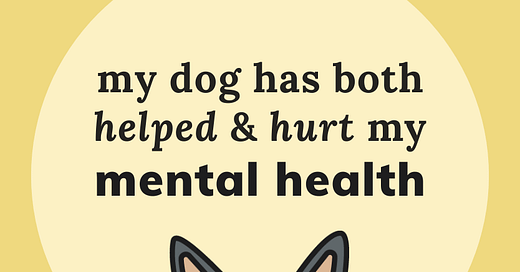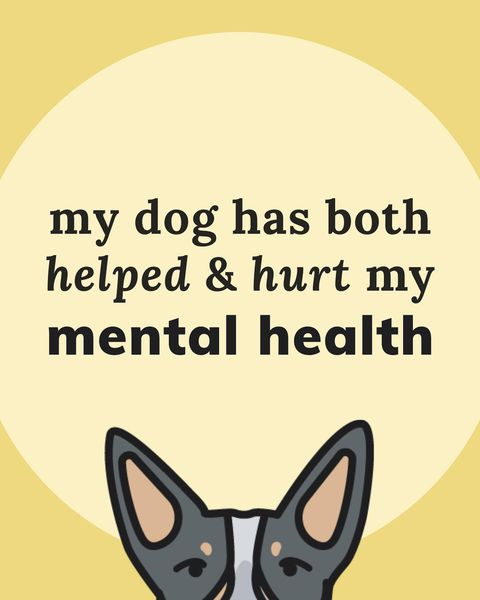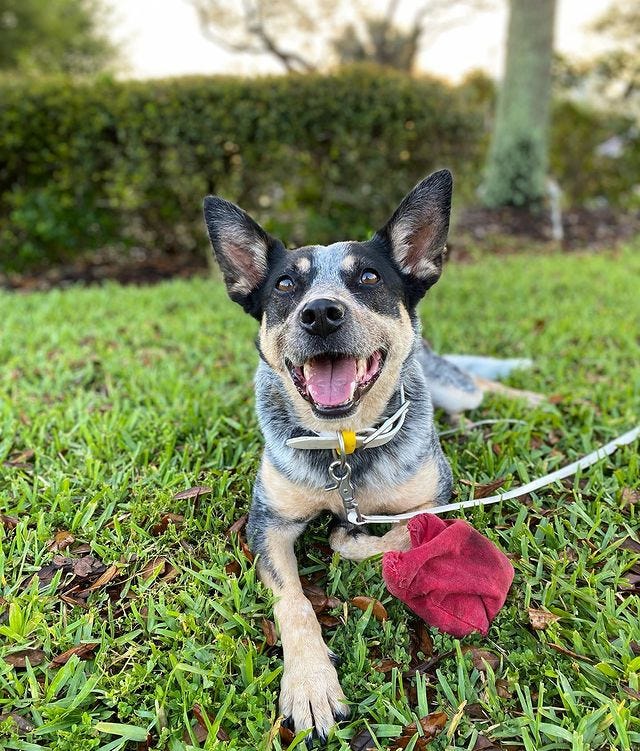My dog has both helped and hurt my mental health
We should be honest about the not-so-rosy realities, too.
A few months ago I read an interesting book called Some We Love, Some We Hate, Some We Eat: Why It’s So Hard to Think Straight About Animals by anthrozoologist Hal Herzog. I previously reflected on its philosophical themes (if you’re interested in a very long article, here’s the link to a fun time ) but lately have been thinking more about one of Herzog’s common topics: Whether pet ownership is healthy for us.
Modern society is full of anecdotes—and a growing number of studies—that claim having a dog can do everything from improve our cardiovascular health to pretty much prevent existential dread. I’ll personally be one of the first to talk about how amazing it is to share life with a canine. I hope my Scout obsession speaks for itself here!
That said: I also think it’s important to share the not-so-rosy realities, too. Sometimes caring for a dog (especially one with anxiety, fear, or behavioral struggles) can be overwhelming. Exhausting. Make our own anxieties worse rather than better. We aren’t alone if life with man’s best friend isn’t always a (literal) walk in the park. And it’s okay to be real about it.
So in the name of honesty and nuance and balance, here are some reflections on how my cattle dog has both greatly helped and sometimes hurt my mental health.
TLDR: Instagram post version
How has dog ownership improved my mental health?
Common claims about how pet ownership is good for people
Some of the most common claims, made by the American Kennel Club, CDC and more, are that:
Dogs can make us feel less lonely.
Pet ownership improves our cardiovascular health.
Hanging out with a dog or cat can lower blood pressure.
Pets can relieve overall stress.
Dogs encourage us to exercise.
Dogs make us more social and maybe even attractive.
Personal experiences with Scout making my life better
Anecdotally, many of these statements ring true for me. Scout has brought countless wonderful things to my life. I often feel like I owe her more than words, or actions, or a whole lifetime of tug and cuddling could ever express.
Here are a few of the most salient examples.
Being a dog owner has made me more resilient
Taking on full responsibility for another living creature cast a light on many of my own struggles… like my emotional volatility and tendency to fixate (quite unproductively) on small details. Training Scout—getting to know her quirks, finding a balance between acceptance and growth, working through difficult moments, finding the joy—has taught me even more about myself.
In our early days together, being charged by an off-leash dog could ruin my mood for a whole week or more. I was regularly close to tears when we were out and about. Everything felt so fragile. I was terrified and didn’t know how to bounce back efficiently.
But Scout needed me to show up—we couldn’t actually hide from the world—and over time building her confidence skyrocketed my own. We still have low moments aplenty, but our ability to recover is better than ever.
Living with animals has helped me be more empathetic
I was a teenager when I first heard that kids who grow up with pets might be better at empathy than those who don’t. It made sense to me. My childhood dogs, cats, and rodents held so much space in my heart. At a young age I found myself imagining their worlds, trying to get into their heads, wondering what it was like to be another creature with experiences so different from my own.
By the time I adopted Scout as an adult, I thought I was plenty empathetic. But she took my desire to put myself in someone else’s shoes to the next level. I spent ages reading, watching, and listening to every resource I could find. I wanted to understand her umwelt. To know her, deeply. To be her best advocate.
And in learning how to be fair, kind, and forgiving to my dog? I learned how to more freely give those things to the people around me, too. To assume positive intent even when fellow dog owners made our lives difficult. To handle scary off-leash dog situations in a way that burned with kindness, not rage.
Scout has truly made me a better friend, confidante, and cheerleader—for humans and animals alike.
I get outside, exercise, and play more!
One of the more tangible benefits of owning a high energy herding breed is that I’m in the best physical shape of my life. I owe a good part of this to Sean, too—he’s always loved to run—but I’m a lot more motivated to get moving when our dog is involved.
We focus on biological fulfillment (providing opportunities to satisfy innate canine instincts) more than straight exercise for Scout, but we still end up sharing a lot of physical activity. Beyond walking and running, we make it a point to play every single day. Learning about how important it is for Scout to let loose has reminded me that I need to do the same thing!
My dog can be a great topic for social connection
I’m lucky that many people around me also love dogs. Sometimes I feel socially awkward or not sure how to engage in a group setting—but being able to talk about Scout can help. I have to be careful not to launch into a twenty-minute monologue, of course… but by and large my excitement to chat canines has been a good thing for my casual connections.
And circling back to empathy, experiencing such an intense passion for a single topic has helped me be a better listener when someone else starts talking about the thing they love. Not much makes me happier than seeing a friend’s face light up when they realize I actually want to hear about their cooking or fishing or woodworking or whatever it may be. We all have our things.
How has dog ownership drained my mental health?
Some data suggests pets can actually harm their owners’ wellbeing
A Tufts University study suggested that female pet owners were more likely than non-owners to have anxiety disorders.
Depression was also twice as common in pet owners as non-owners (true of both dog owners and cat owners).
Only 5 of 30 studies found that, as a group, pet owners suffered less from depression than people who did not live with a companion animal.
Ultimately, the research is mixed. Exact conclusions are unclear, especially when considering the inherent flaws of most survey methodologies and the many confounding variables at play in our lives—but there’s enough info that we should probably be cautious about making sweeping “pets are great for you” claims.
My personal experiences being overwhelmed as Scout’s owner
Scout has obviously given me some wonderful, incredible, amazing things. But she’s also contributed to—or outright been the source of—some of my biggest struggles. And while working through these challenges has made me a stronger person, they haven’t always been healthy overall.
To be clear: These things are not Scout’s “fault”. This discussion isn’t about assigning blame or pointing fingers! It is about acknowledging the sometimes-painful reality of caring for another creature, especially a sensitive one with specific needs.
Being responsible for a sensitive dog has made me more anxious
I’ve always been prone to anxiety—and living with a fearful dog has made it worse.
Scout isn’t exactly an “oh she’ll be fine” kind of creature. She’s sensitive to her environment. She’s prone to developing negative associations (more quickly than I even thought possible). She’s sweet as can be, of course, and incredibly loving… but sometimes she feels so fragile it’s paralyzing.
I find myself preoccupied with so many things I never used to pay attention to. Always calculating potential risks and costs. Scanning my environment. Obsessively planning ahead. Stressing stressing stressing…
And while coming to terms with these things has ultimately given me an opportunity to build my own resilience, I sometimes wish it hadn’t been such an overwhelming “baptism through fire” situation.
Worrying about Scout has prevented me from enjoying myself
As mentioned above, I feel like the queen of worrying about my dog. And that worry can suck the joy out of almost anything.
When Scout first started showing dog reactivity, I struggled to enjoy almost any excursion for fear that an off-leash dog would ruin it. When she initially met some of our friends and family, I couldn’t just be present with my loved ones because I was afraid they wouldn’t like her, they’d see her “bad” side, they’d think I couldn’t handle her. When she was first diagnosed with epilepsy, I was unable to leave her home alone without panicking that she’d have a seizure when I was gone.
The examples are endless.
And then there’s this underlying feeling of shame sometimes. It’s like everyone knows that dog ownership is good for you—dogs are obviously so lovely, so easy, so healthy for us—and if we struggle then we must be doing something wrong. The experience is all on us.
I’ve found myself despairing in many moments, worrying that all of Scout’s problems are because of me, that my inability to fix them reflects my worth (or lack of), that if I was just smarter or stronger or tougher everything would be rosy all the time. I know that’s not logical—I can hear how silly the words sound even as I type them—but that doesn’t make the emotions any less real or any less damaging.
Getting so invested in the dog community has sometimes made me bitter
As much as I’ve struggled with feelings about myself as Scout’s caretaker, I’ve also felt bitterness towards other owners, too.
Make no mistake: It’s fair to be annoyed when someone else prevents us from enjoying a shared public space, to wish that I could trust strangers and their dogs in public, to feel upset when my hard work with Scout is threatened by someone who just doesn’t care.
But it’s not productive for anyone—me, my dog, those around us—when that annoyance turns into complete disillusionment or blind rage.
There have been moments where I find myself choking back swear words. Feeling adrenaline build in my system at the mere sight of another dog owner. Wishing every other pet on the street would just disappear entirely. For someone whose been an enormous animal lover since childhood—who used to light up at the sight of a lab playing with his owner or a terrier resting on a patio—admitting (and trying to work through) these emotions has been devastating.
So… what does this all mean?
All of this reflection brings me to one of my most common conclusions: We need to embrace nuance, balance, and middle ground.
Any given situation has countless variables at play, from owner preferences to preexisting health conditions to lifestyle opportunities and access to resources… and what’s most productive is considering how all those pieces can work together for different results.
Make no mistake: Canines and humans coevolved together. There is so much magic in our ancient bond! I’m absolutely not trying to say that dogs aren’t good for us (and I don’t think that’s Herzog’s central goal, either).
But I don’t think we should take it for granted that dogs are automatically, inherently healthy for their owners. You’re not “doing it wrong” if pet ownership feels suffocating or impossible. You’re not alone if your dog makes you cry as much as she makes you laugh.
At the end of the day, we should be reasonably skeptical about warm-and-fuzzy claims—not just because it’s good science, but because those generalizations can hurt. Life with dogs isn’t the same for every owner. It’s not always seamless or easy.
And there’s no shame in admitting that as much as we love our canine companions, they can be a source of struggle too.
Related further reading
Books & articles by animal researchers and journalists
The Impact of Pets on Human Health and Psychological Well-Being: Fact, Fiction, or Hypothesis?
All Herzog articles in the WellBeing International Studies Repository
The Benefits of Having a Pet and Surprising Science Behind It
Our own reflections
One of Paws and Reflect’s key themes is processing my own emotional journey in life with Scout. The below blogs compile some related thoughts!







